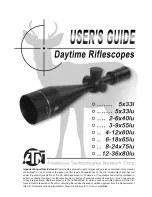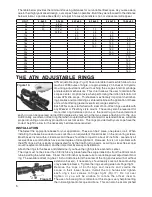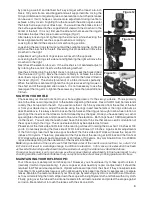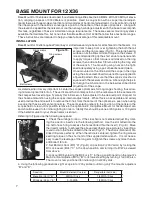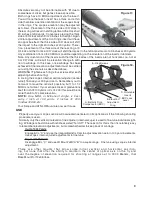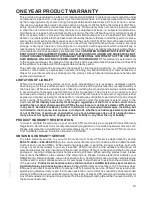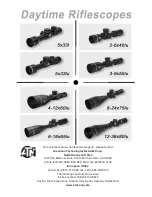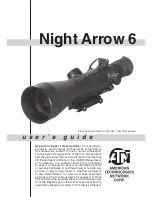
3
For shooting at the distance up to 100 yards - turn focusing ring in the direction to the mark 100 m
against stop.
For shooting at the distance over 100 m turn the focusing ring in the direc-
tion to the mark
∞
against stop.
Pre-zerOING:
Pre-zeroing is recommended and can be done with a scope guide or bore
sight.
CAUTION: Be sure gun is not loaded. Use safe gun handling procedures
all the time.
zerOING:
CAUTION: All shooting should be done at an approved range or other safe areas. Eye and ear protection
is recommended.
Danger: If you used a bore-obstructing device, remove it before proceeding. If the barrel has-been drilled
for a mount, check that the screws do not protrude into the bore. Do not fire live or even blank ammunition
with an obstructed barrel. An obstruction can cause serious damage to the gun and possible personal injury
to yourself and others nearby.
From a steady rest position, fire three rounds at a 100 yard target.
Observe bullet strike on target and adjust windage and elevation screws
as needed to correct aim. You will need to
remove the dust caps from the top of the
windage and elevation adjustments to do
this (Fig.5).
NOTE: Each click of adjustment changes
bullet strike by the amount shown on the
chart below.
When you have finished zeroing, replace
windage and elevation dust caps.
electrONIc retIcle:
Your scope has an Electronic reticle. There are 12 positions of bright-
ness. The rheostat is manipulated by the knob located at the back of the
scope. It is labelled with numbers from 0 to 11. When the rheostat is set to
0 you will see a black etched reticle. The reticle will light up red elec-
tronically as you rotate the rheostat through the numbers, 11 being the
brightest (Fig.6).
usING the atN raNGeFINder retIcle:
The rangefinder reticle in your scope was designed to assist you in determining the range of your target.
These distances are based on a 6’ target, if a 6’ target fits between the numbered baseline (the five short
horizontal lines and the post of the reticle above the baseline determines your distance. If a 6’ target
fits between the horizontal post of the reticle and 2 the target is 200 yards away. If the same target fits
between the 4 and the horizontal post of the reticle the target is 400 yards away. The same is with the 6
and 10. The target would be either 600, 800 or 1000 yards away
(Fig.7)
.
NOTE: The 5x33 series and the 2-6x40 utilize a range finder based on a three foot target.
Figure 4
Figure 6
Windage/Elevation
(inches of movement per click)
50 Yards - 1/16”
100 Yards - 1/8”
200 Yards - 1/4”
300 Yards - 3/8”
Figure 5
Elevation
Windage
Figure 7.
If a 6’ target
fits between
t h e s e t w o
lines t hen
the target is
20 0 yar d s
away.
If a 6’ target
fits between
t h e s e t w o
lines t hen
the target is
4 0 0 yar d s
away.
If a 3’ target
fits between
t h e s e t w o
lines t hen
the target is
20 0 yar d s
away.
If a 3’ target
fits between
t h e s e t w o
lines t hen
the target is
4 0 0 yar d s
away.
2
4
10
6
5x33 series reTicle

